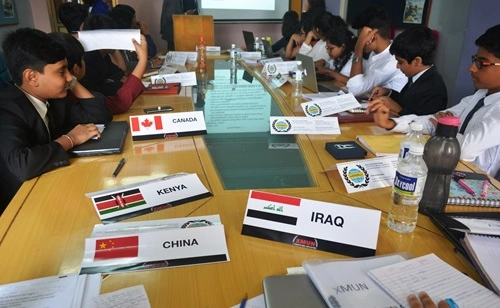In an increasingly polarized world, where political decisions affect every aspect of daily life, the need for informed and engaged citizens has never been more critical. Schools serve as the foundational institutions where young minds are shaped, and yet, discussions about politics remain a contentious issue in many classrooms. Some argue that politics is too divisive for school settings, while others believe that discussing political topics fosters critical thinking, civic engagement, and media literacy. With recent developments in education policies and civics curricula across the United States, the debate is more relevant than ever.
This article explores why politics should be an essential part of classroom discussions, how it can benefit students, and what the latest research and educational initiatives say about political discourse in schools.
1. Politics Shapes Everyday Life

From healthcare policies to climate regulations, tax laws, and education reforms, political decisions directly influence our lives. If students are to become responsible adults capable of making informed decisions, they need to understand how these policies work. Schools have a duty to equip students with knowledge about governance, laws, and policies so they can engage meaningfully in society.
A report from the Center for Information & Research on Civic Learning and Engagement (CIRCLE) found that young people who receive a strong civics education are more likely to vote, volunteer, and participate in political discussions than those who do not. Yet, less than 25% of U.S. students score proficiently in civics education, according to the National Assessment of Educational Progress (NAEP).
2. Developing Critical Thinking Skills
Discussing politics in schools allows students to develop critical thinking and analytical skills by evaluating different perspectives, fact-checking information, and forming their own opinions based on evidence. In a world where misinformation is rampant, the ability to distinguish fact from fiction is essential.
For example, an increasing number of states are implementing media literacy programs in response to concerns about misinformation. A 2023 initiative in California introduced a program requiring schools to integrate media literacy into civics education, helping students analyze political content critically.
The ability to debate respectfully and understand multiple viewpoints also fosters a culture of healthy discourse rather than hostility—a skill crucial for future professionals, policymakers, and citizens alike.
3. Encouraging Civic Engagement and Responsibility
Democracy thrives when its citizens are active participants in governance. Yet, according to a 2022 report by the Pew Research Center, voter turnout among young people remains significantly lower than among older generations. One reason cited for this trend is a lack of education on how government systems function and how voting impacts policy decisions.
Civics education programs such as “Action Civics”—a model that encourages students to engage directly in political issues affecting their communities—have been gaining traction. A study conducted by the Education Commission of the States found that students who participate in action civics programs are more likely to vote and engage in local government initiatives.
For instance, in 2024, Florida launched the Civics Literacy Excellence Initiative, requiring students to pass a civics assessment before graduation, ensuring they understand the electoral process, the Constitution, and the roles of government branches.
4. Preparing Students for Real-World Issues
Political decisions influence real-world issues such as gun control, abortion rights, economic policies, climate change, and healthcare access. Educating students about these topics allows them to understand their rights, responsibilities, and the broader implications of political decisions.
The Harvard Kennedy School released a report in 2023 highlighting the importance of civics education in preparing students for participation in a democracy. The report emphasized that “the lack of political education leaves young citizens vulnerable to misinformation, apathy, and disengagement.”
A case study from New York’s Civics for All Initiative, implemented in 2023, demonstrated that students who engage in structured discussions about contemporary political issues show greater empathy, higher levels of political knowledge, and an increased likelihood of engaging in community service.
5. Addressing the Polarization Crisis
Political polarization is a growing concern in the U.S., with heated debates often leading to social divisions. Schools can play a crucial role in teaching students how to engage in respectful political discussions without resorting to hostility.
Several studies, including one by Stanford University’s Polarization and Social Change Lab (2023), suggest that students who participate in structured political discussions are more likely to develop tolerance for opposing viewpoints.
By allowing students to express and defend their beliefs in a structured environment, schools help prepare them for civic life, where compromise and understanding are necessary.
FAQs
Q1. Isn’t politics too controversial for schools?
Ans: While politics can be divisive, teaching politics does not mean endorsing a particular ideology. Instead, educators can provide a neutral platform for students to explore political topics, ask questions, and form their own opinions.
Q2. Shouldn’t parents be responsible for teaching politics?
Ans: While parents play a significant role in shaping political beliefs, schools provide a structured, fact-based environment where students can engage with different perspectives beyond their family’s political views.
Q3. How can political discussions be unbiased in classrooms?
Ans: Teachers can use evidence-based teaching methods that focus on facts, historical context, and multiple perspectives. Using primary sources, data analysis, and debates ensures that discussions remain educational rather than ideological.
Q4. Will political discussions lead to more classroom conflicts?
Ans: When conducted properly, political discussions can teach students how to handle disagreements respectfully. Schools can implement debate guidelines and civic dialogue techniques to ensure discussions remain constructive.
Q5. Are any states already implementing political education in schools?
Ans: Yes, several states have expanded their civics education programs. For instance:
- Illinois requires high school students to complete a semester of civics education before graduation.
- California has introduced media literacy and political debate modules in its high school curriculum.
- Florida now mandates a civics literacy exam for graduation.
Conclusion
Politics is an integral part of daily life, and young people must be prepared to engage with it responsibly. Schools provide a safe and structured environment where students can explore political issues, develop critical thinking skills, and learn about civic responsibilities.
By incorporating fact-based, nonpartisan political discussions into the curriculum, schools can empower future voters, leaders, and policymakers who will shape the nation’s future. If the goal of education is to prepare students for the real world, then teaching politics is not just an option—it is a necessity.



